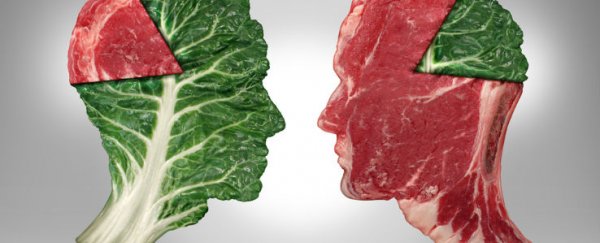A new study of 11,000 former and current vegans and vegetarians over the age of 17 in the US has found that, while people are generally eating less meat, those who choose to give it up altogether struggle to keep up the habit.
The research was conducted by the US Humane Research Council - an organisation that provides research to animal protection groups - as part of their new project to promote meat-free diets to the American public. The findings suggest that rather than pushing a full-on vegetarian diet, the more effective strategy would be to push a low-meat diet that is more likely to last.
The researchers found that currently in the US, 2 percent of people identify themselves as vegans/vegetarians, 10 percent are former vegans/vegetarians, and 88 percent of the population have never been vegans and vegetarians. "Put another way," says Jessica Leber at Fast Company, "they found that only one in five vegetarians and vegans maintains their diet; a full 84 percent eventually revert back to eating meat or other animal products."
The study focussed on the 12 percent of current and former vegans/vegetarians to figure out the main reasons for such high rates of vegetarian and vegan lapsing.
The results showed that 65 percent of former vegans/vegetarians decided to transition to their meat-free diets over the course of just few days or weeks, while 53 percent of current vegans/vegetarians transitioned that rapidly. They also found that a third of the former vegans/vegetarians reverted to their meat-eating ways within three months of their change of diet. More than half of the former vegans/vegetarians ditched the diet within a year.
The researchers say it's not entirely clear if people give up their meat-free diets more for social reasons - pressures related to the fact that vegans/vegetarians place themselves in a minority with their diets - or challenges related to the diet itself - such as health or financial considerations.
According to Leber, relationships turned out to be a big factor, with a third of the former vegans/vegetarians reporting that they gave up the diet while living with a meat-eating partner.
"The findings do illuminate some things that many lapsed vegetarians/vegans have in common, such as transitioning to the diet too quickly, not being involved socially with other veg folks, and not being able to address certain food cravings," the researchers concluded. "The study also shows that current vegetarians/vegans have a wide range of motivations that keep them veg, which may mean that more diverse messaging and outreach could have a positive impact."
Interestingly, when the study looked into the reasons that the current vegans/vegetarians took up the diet in the first place, the researchers found that this group was more likely to have a bunch of reasons for taking up the diet - animal welfare, concern for the environment, and health reasons were the main ones. More than half of the former vegans/vegetarians had just one reason for taking up the diet - health.
Thanks to the extreme actions of a select few, animal advocate groups have at times struggled to maintain a favourable reputation with the public, particularly in the US, where PETA continues to embarrass itself. It's great to see efforts like this to understand the motivations and challenges that come with a significant diet change, and the acknowledgement that giving up meat is not the only way to address both the health, animal welfare, and environmental concerns that come from farming animals to the degree that we are now.
"The latest findings once again show that a message focussed on reduction instead of elimination of animal products may be more effective to create an overall decline in animal product consumption," the report concludes. "Advocates would be well advised to soften their appeals to avoid suggesting the choice is all or nothing."
Sources: Fast Company, Humane Research Council
